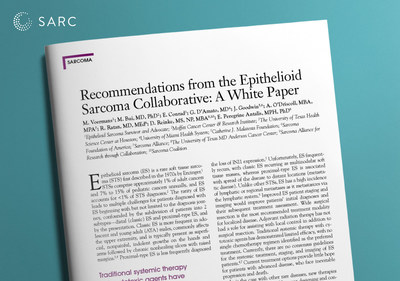Patients diagnosed with a rare cancer called Epithelioid Sarcoma face many challenges that will impact their outcome, beginning with the lengthy timeframe between presentation of the disease and a confident diagnosis to ultimately finding access to proper treatment and care through a sarcoma specialist.
ANN ARBOR, Mich., Oct. 12, 2021 /PRNewswire/ -- Patients diagnosed with a rare cancer called Epithelioid Sarcoma face many challenges that will impact their outcome, beginning with the lengthy timeframe between presentation of the disease and a confident diagnosis to ultimately finding access to proper treatment and care through a sarcoma specialist.
There is very little information available about Epithelioid Sarcoma (ES). That is why the recently established Epithelioid Sarcoma Collaborative is working to help increase awareness and understanding of ES, especially among general practitioners and other care providers who may be the first point of contact for people with the disease.
"Recommendations from the Epithelioid Sarcoma Collaborative: A White Paper" has now been published in the Journal of Oncology Navigation and Survivorship. This white paper is the result of a partnership between the Epithelioid Sarcoma Collaborative and SARC (Sarcoma Alliance for Research Through Collaboration).
"Increasing awareness and understanding of soft tissue sarcoma among patients and providers may be the first step to decreasing the time to a correct diagnosis, reducing barriers to timely treatment and access to experienced sarcoma centers," says Maria Voermans, an ES survivor and advocate who is an author of the white paper.
Epithelioid sarcoma (ES) is an uncommon soft tissue sarcoma (STS). STS comprises less than 1 percent of all cancers, but 7–15 percent of pediatric cancers annually. Most frequently affected are adolescent and young adult males.
Because the cancer is so rare, the warning signs of STS – which include a nontender, soft tissue mass that can be of any size – are not typically recognized as a malignancy. Additionally, the first clinicians to be consulted, such as primary care physicians, sports medicine doctors, or dermatologists, are in general not familiar with ES and/or sarcoma symptoms. This lack of familiarity in the primary care setting all too often leads to a delay in appropriate imaging and/or biopsies. This can result in delayed diagnosis and can absolutely affect patient survival.
To understand the full range of challenges experienced by patients diagnosed with ES, the Epithelioid Sarcoma Collaborative – a multidisciplinary focus group including patient advocates and sarcoma medical experts – convened to assess the patient experience and identify priority areas for new efforts.
"This analysis and review by the Epithelioid Sarcoma Collaborative gave us the opportunity to better understand the diagnostic journey of patients and the delays associated with achieving an accurate diagnosis and treatment. An accurate diagnosis requires a timely MRI, accurately interpreted by a radiologist, with an appropriate biopsy by an experienced surgeon or radiologist that is then diagnosed by an experienced sarcoma pathologist. Those diagnoses are particularly challenging with some of the more uncommon and difficult sarcoma subtypes, like ES. A successful diagnosis and treatment result depends on timely referral to a dedicated, multidisciplinary sarcoma team," says Ernest U. (Chappie) Conrad, MD, FACS, who currently serves as the Chair of the SARC Board of Directors and participated in the review.
The Epithelioid Sarcoma Collaborative's recommendations include establishing an ES standard of diagnosis for healthcare providers presented with symptoms such as a lump or cyst, to help prevent ES from going undiagnosed.
The Epithelioid Sarcoma Collaborative's white paper is available on JONS online (https://www.jons-online.com/issues/2021/september-2021-vol-12-no-9/3914-recommendations-from-the-epithelioid-sarcoma-collaborative-a-white-paper).
To learn more about the SARC organization, its work, and clinical trials, please visit the SARC website at www.sarctrials.org.
About SARC
SARC (Sarcoma Alliance for Research Through Collaboration) is a US-based, non-profit (501(c)(3)) sarcoma research consortium solely dedicated to fostering progress in the prevention and treatment of sarcoma in order to improve patient outcomes and ultimately find a cure.
Given the rarity of sarcoma and the multiple histologic subtypes, no single institution has sufficient patient resources for timely accrual and adequate statistical power to complete trials that will yield meaningful results. Accordingly, SARC was formed in 2003 by the sarcoma research community to bring together the best cancer centers in the world supported by centralized infrastructure for the conduct of multi-institutional collaborative sarcoma research. Since founding, SARC has successfully established itself as a leader in providing a unified platform for sarcoma experts to collaborate and accelerate Phase I, II and III clinical trials (SARC as sponsor), correlative studies to better understand what drugs and combinations are most effective in treating sub-groups of patients, young investigator mentorship and grants programs, and the investigation of key biological questions across nearly 90 medical centers with specialized sarcoma programs in the United States and globally.
What is Sarcoma?
Sarcomas are cancers of the bony skeleton (the skull, vertebrae, ribs, and extremities), and also the muscle and other tissues attached to, supporting, or joining those bones. Sarcomas can occur in people of all ages. Although there are many different types of sarcomas, it is still a very rare disease. Therefore, few physicians have experience in dealing with sarcomas, so it is not uncommon for it to be difficult to arrive at a diagnosis of sarcoma. This fact is simply a reflection of the rarity of this cancer. SARC and our collaborators are working to advance the science and knowledge of sarcomas.
![]() View original content to download multimedia:https://www.prnewswire.com/news-releases/epithelioid-sarcoma-collaborative-publishes-white-paper-outlining-challenges-and-proposing-solutions-to-improve-outcomes-of-patients-facing-rare-cancer-301397535.html
View original content to download multimedia:https://www.prnewswire.com/news-releases/epithelioid-sarcoma-collaborative-publishes-white-paper-outlining-challenges-and-proposing-solutions-to-improve-outcomes-of-patients-facing-rare-cancer-301397535.html
SOURCE SARC






